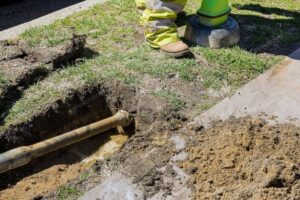Homeowners know the importance of routine maintenance. You must ensure everything is in top shape, from the attic to the garden and the HVAC system. But if your home has a concrete slab foundation, you must be prepared for slab leaks. That’s because slab leak repairs can become costly if you ignore the problem. The most common signs of slab leaks include:
- shifting soil
- a patchy or uneven lawn.
- mold growth on the walls or floors
- splits and cracks in the foundation
Excessive pressure from slab leaks can also cause your floor to burst or erupt. If you know why slab leaks happen, it will be easier to deal with this issue.
Outline:
Causes of Slab Leaks
Slab leaks can happen due to various reasons. Here are some of them.
- Highly Acidic Water
Water with a pH level of 7 is neither basic nor acidic. If the pH value of water exceeds 7, it’s more basic or alkaline. But if it’s less than 7, it’s more acidic. Highly acidic water can cause the pipes underneath the slab foundation to break down slowly and crack over time. Thus, many homeowners use a water softener to remove calcium, magnesium, and other minerals from the water.
However, using a water softener can damage your plumbing system. Soft water has a pH level that varies between 9 pH and 14 pH. If your water is highly alkaline, the pipes underneath the slab foundation will slowly collapse and leak. To confirm if you have highly acidic water, look for blue or green stains in the shower, toilet, bathroom, and kitchen sink.
- Outside Pressure
The joints between pipes can become loose and disconnect due to vibrations caused by earthquakes, soil erosion, or underground streams. Holes and cracks can also form in the lines due to this sudden movement. Slab leaks from outside pressure are usually large and cause considerable damage. If left alone, it can cause flooding. Noises resembling running water are among the most common signs of slab leaks. When leaks form in the slab foundation, you’ll notice mildew and mold on the walls, ceiling, or floors. You need to hire a pro in slab repairs to prevent further damage to your plumbing system.
- Abrasion
The pipes circulate water to your appliances, but the water movement causes the lines to brush against your concrete slab. It can also scrape against other pipes, gravel, and dirt. When this happens, the increased friction causes damage to the pipes. The exterior of the pipes becomes too thin, causing leaks to form near the slab foundation.
- Old Copper Pipes
Copper pipes degrade due to high salt levels, high amounts of liquefied oxygen, highly alkaline or acidic water, and incorrect electrical hardware grounding. Older homes with copper pipes are more likely to experience slab leaks. Severe slab leaks will form if your copper pipes have holes or cracks.
- Time
Pipes will break down over time. This issue is common in older homes with lines made from galvanized steel pipes or other antiquated materials. If you’re in this situation, consider replacing the worn-out pipes before it becomes a bigger problem.
- High Water Pressure
Constantly running toilets, dripping faucets, pinhole leaks, and damaged appliances are common indicators of high water pressure. The standard rating for water pressure varies between 40 and 80 PSI depending on the suburb or city. If the water pressure is lower or higher, the pipes underneath the floor can become damaged and develop slab leaks. Installing pressure-reducing valves can protect the lines and prevent this problem.

How to Fix Slab Leaks
If you’re dealing with slab leaks, call a professional immediately. They use modern equipment like electronic listening tools to pinpoint the leak’s location. After locating and isolating the leak site, you can choose several ways to fix it. These are your options:
- Trenchless Plumbing
The best part about trenchless plumbing is that it is non-destructive and less expensive than traditional slab leak repair methods. Trenchless plumbing requires creating access holes to fix the slab leak. The repair crew will inspect the plumbing system to determine the extent of damage and clean your pipes if trenchless plumbing is viable. After cleaning the pipes, they will seal them with epoxy liners. Pipe slitting is also possible if the water lines are badly damaged.
- Tunneling
Tunneling involves digging working tunnels under the property without compromising your home’s structural integrity. The repair crew will crawl into the tunnel to remove the degraded pipe and hang a new one from the slab. Tunneling is a good option for homeowners who don’t want to cut through their floors. This method helps save costs in repairing damaged finishes and flooring. However, tunneling poses serious structural repercussions, liability, and safety concerns. Trenchless methods like pipelining can be a good alternative for those who want to eliminate these risks.
- Pipe rerouting or re-piping
Re-piping involves replacing your old plumbing system with a new one. It’s usually the best option for an older home with worn-out pipes. Meanwhile, rerouting entails cutting and capping the leaking pipe and relocating the lines to a new spot. The plumber usually reroutes the pipes through the ceiling, attic, or wall cavities. Consider rerouting your pipes if you prefer a less invasive method to fix slab leaks.
Slab leaks should never be left alone. Call us immediately if you notice splits and cracks in the foundation or other signs of slab leaks. We will send a slab leak specialist to determine the real cause of the problem and perform the appropriate slab leak service. Contact us to get a free quote today!



